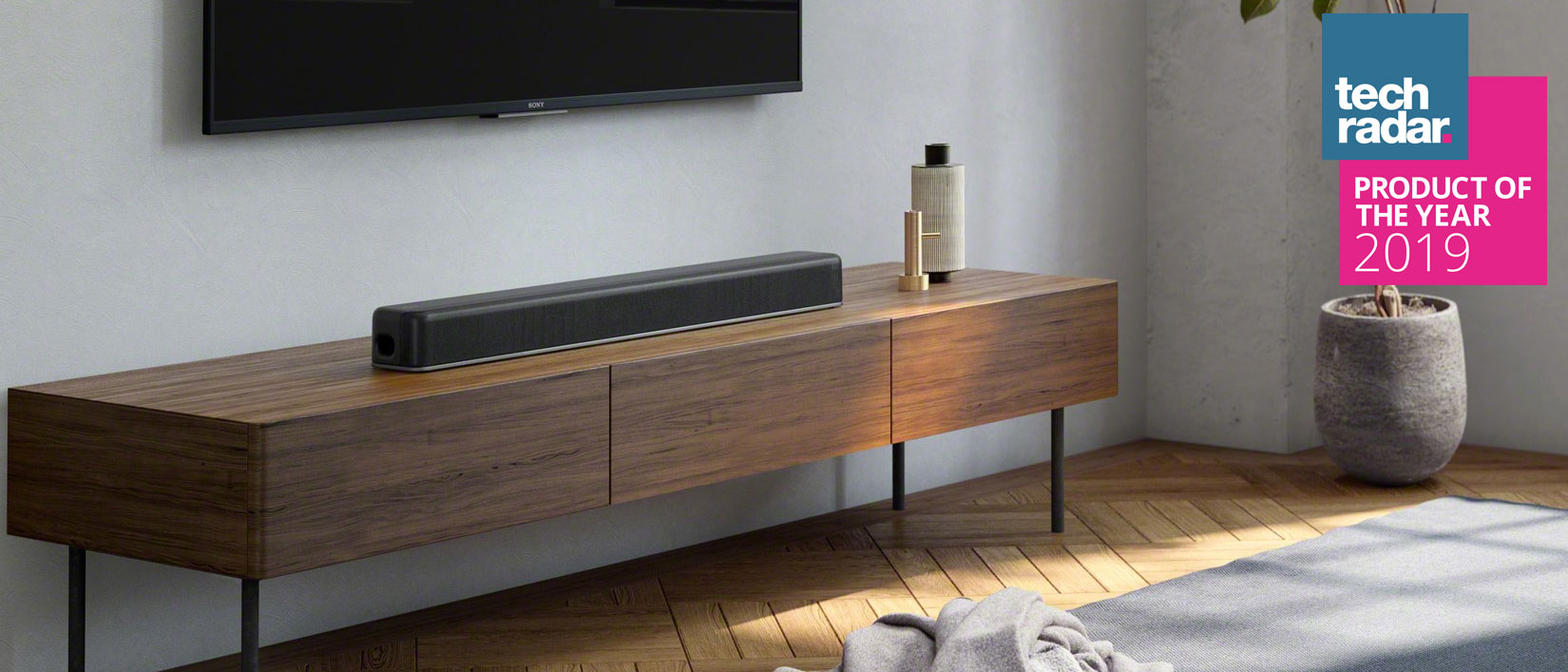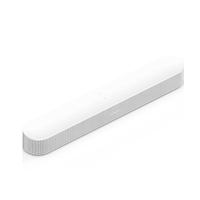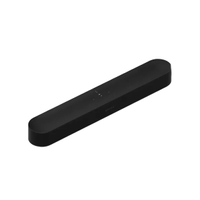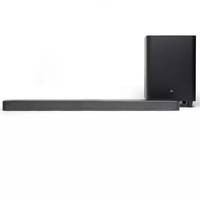TechRadar Verdict
The Sony HT-X8500 soundbar belies its mid-range price with a blockbuster audio performance. The soundstage is wide, with lovely wraparound sound processing courtesy of Sony’s clever Vertical S, and that internal subwoofer is a proper beast.
Pros
- +
Dolby Atmos and DTS:X compatible
- +
Easy to set-up and use
- +
Brilliant value
Cons
- -
No upfiring drivers
- -
Not High-Res Audio capable
- -
Stripped back feature set
Why you can trust TechRadar
The Sony HT-X8500 soundbar is great value for money. But if you find the very idea of a simplified 3D soundbar preposterous, you’re not alone.
We all know that Dolby Atmos relies on height information to create a truly immersive soundstage, but like its more expensive HT-ZF9 predecessor, the Sony HT-X8500 uses advanced DSP audio processing to compensate for the lack of dedicated up firing drivers.
Sure, it comes with some caveats, but the $299 / £350 / AU$599 HT-X8500 was one of the best soundbars money could buy back when it first launched in 2019 and continues to be a solid recommendation.
It's firmly in the mid-range soundbar category, and if you can afford to stretch your budget a little more you should read our Sonos Beam (Gen 2) review. Or taken a look at our Sony HT-S400 Soundbar review, which at $299 / £269 / AU$499 is an even more budget-friendly alternative with fantastic audio quality.
Although it’s no longer a top pick in our best soundbar or best soundbar for under $200/£200 guides – with newer additions taking centre stage – because it's older, it’s often heavily discounted. This makes it an even better option for anyone who wants to upgrade the audio of their TV’s built-in speakers without spending a small fortune. Read on for our Sony HT-X8500 soundbar review.
Sony HT-X8500 Soundbar review: design
- A self-contained audio system
- Understated style
The Sony HT-X8500 soundbar is a self-contained audio system. There’s no separate wireless subwoofer, nor extraneous wireless surround speakers. It’s a smart, singular soundbar designed to fit just about anywhere.
Dimensions: 890 mm x 64 mm x 96 mm
Weight: 31.kg
Bluetooth: 5.0
Features: HDR, Dolby Vision, Dolby Atmos and DTS:X compatible, remote control
The subwoofer may be built-in, but the bar remains pleasingly slim. A modest 89cm wide, it’s suitable for TVs measuring between 49-55-inches.
The cosmetic finish has a sense of style. The front-facing array is protected by a smart rolled grille, while a gun metal grey trim adds interest. Up top are touch-sensitive buttons, for power, input selection, volume and Bluetooth pairing.
Connectivity is relatively sparse, limited to just two HDMIs, one an input, the other an output with eARC. There’s also an optical digital audio input, for when ARC isn’t available. The 4K HDMI board is compatible with Dolby Vision, HDR10 and HLG.
Overall, the Sony HT-X8500’s compact design is easy to live with, with no separate subwoofer to claim floor space. Instead we get twin forward facing woofers. Perhaps, surprisingly for a Dolby Atmos soundbar, there are no up firing drivers and HDMI connectivity is limited.
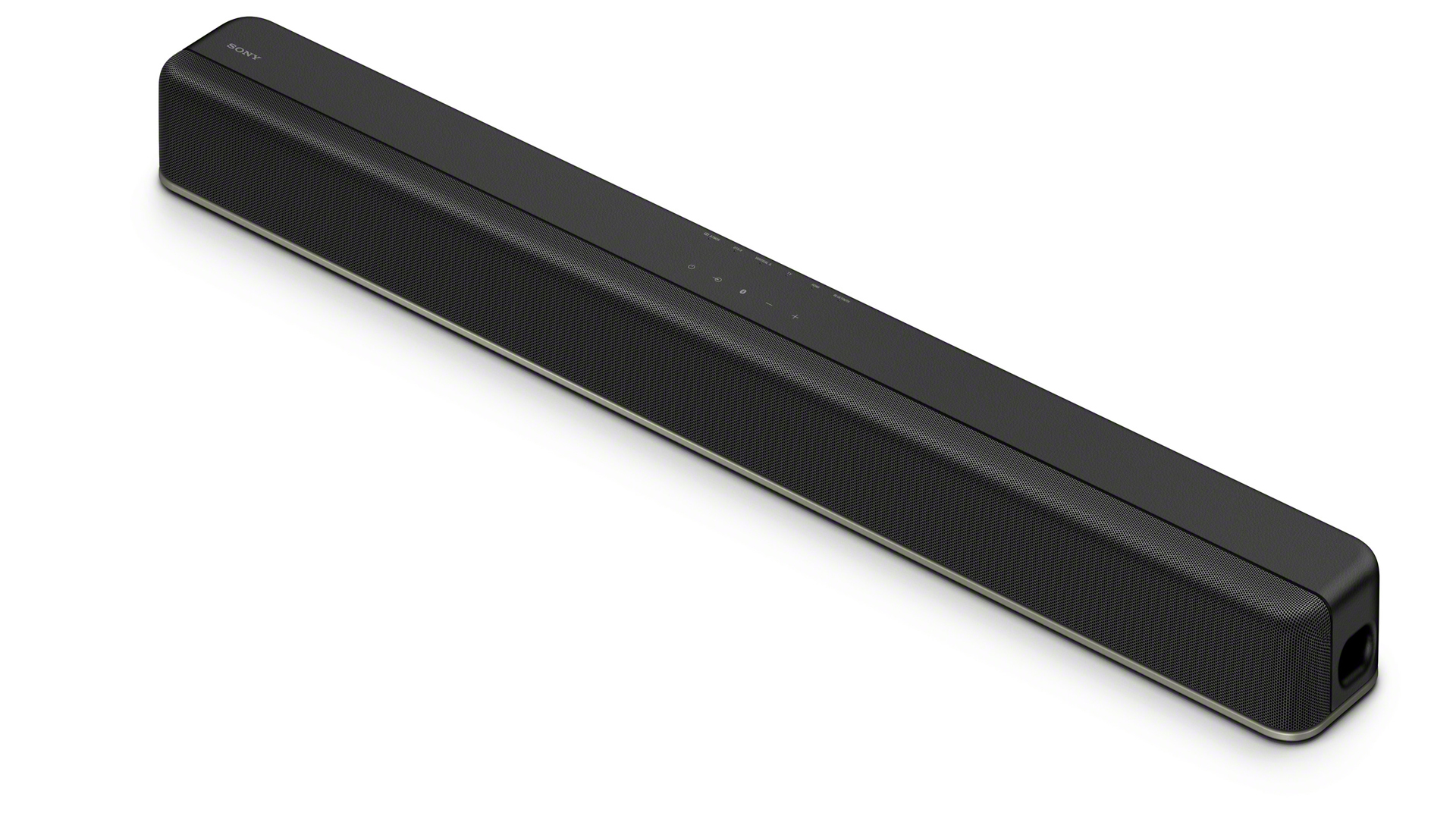
Sony HT-X8500 Soundbar review: features
- Stripped back feature set
- No calibration required
Sony has opted for a stripped back feature set here to keep costs down. There's no smart Wi-Fi connectivity, or on-screen menu. Instead the soundbar communicates via LED lights, which signpost Dolby Atmos and DTS-X sources, as well chosen inputs.
The Sony HT-X8500 soundbar is driven by a thin finger-style remote control, which despite its dimensions is not shy of buttons. All the various sound presets are given prominence, alongside processing modes.
Such simplicity makes this an easy system to live with. As it doesn’t depend on reflected sound to create its virtual surround effects, you can simply sit it in front of the telly, or wall mount. There’s no calibration required.
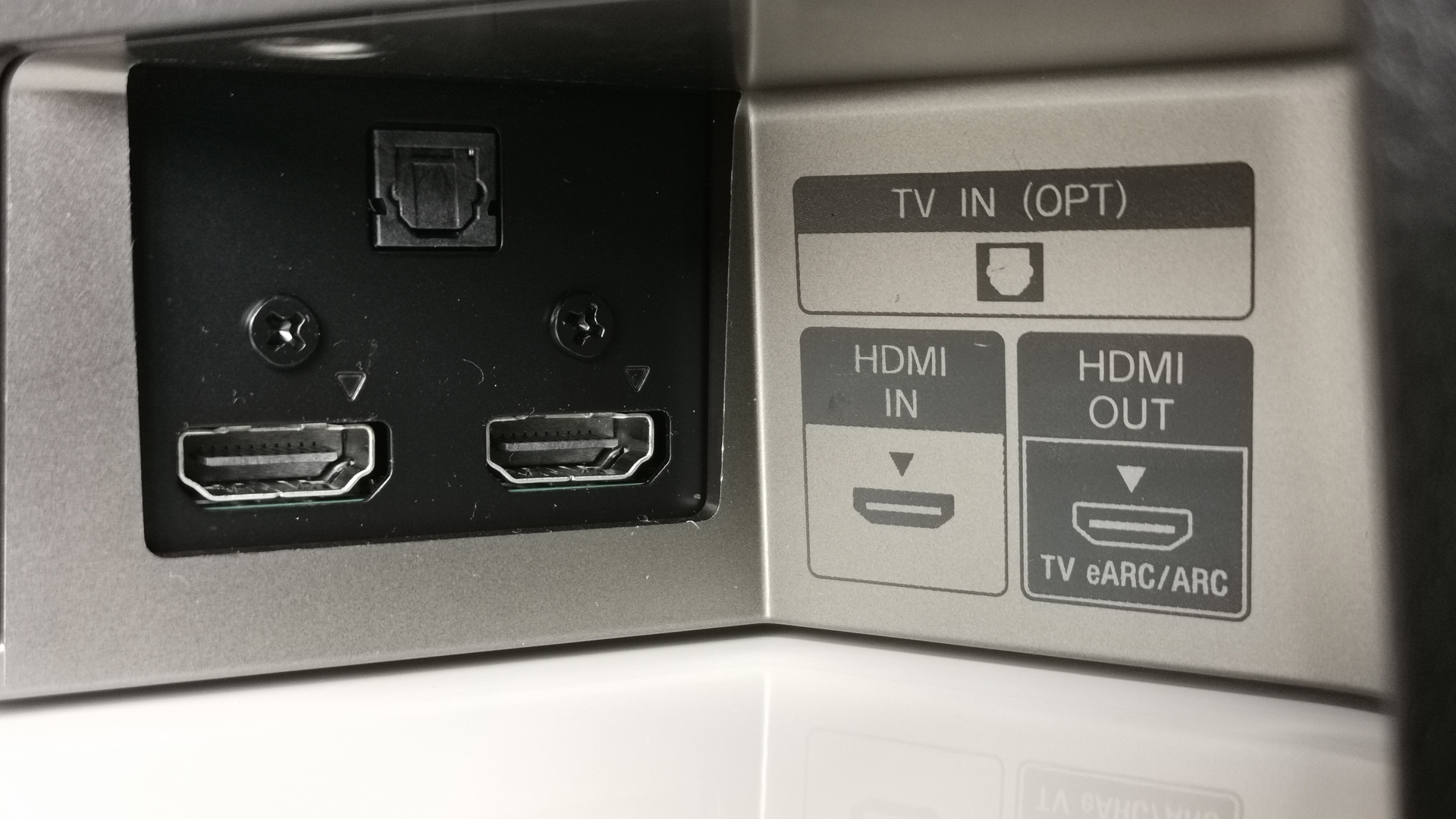
Sony HT-X8500 Soundbar review: performance
- Truly cinematic sound
- Dolby Atmos and DTS:X compatible
Any reservations we had about the performance of this mid-ranger were blown away when powered up - this soundbar is convincingly cinematic.
The key to the Sony HT-X8500 soundbar's gutsy performance is Sony’s proprietary Vertical Sound Engine. Working with Dolby Atmos and DTS:X content, it creates a convincing illusion of wraparound sound that allow Dolby Atmos movies to play with a clear sense of expanded height and width.
Even better, Vertical S doesn’t just work with immersive codecs, either - it can be used as an up-mixer for two channel and conventional 5.1 sound sources too, to similar good effect.
Perhaps the biggest surprise is the internal subwoofer. It may be modest, but this all-in-one thumps like an ogre’s headache. With a bass response down to 50Hz, the rumbles aren’t seismic, but they’re persistent. Some may even find the balance of those twin forward-facing woofers a little overbearing at times, but their sheer enthusiasm is hard to fault.
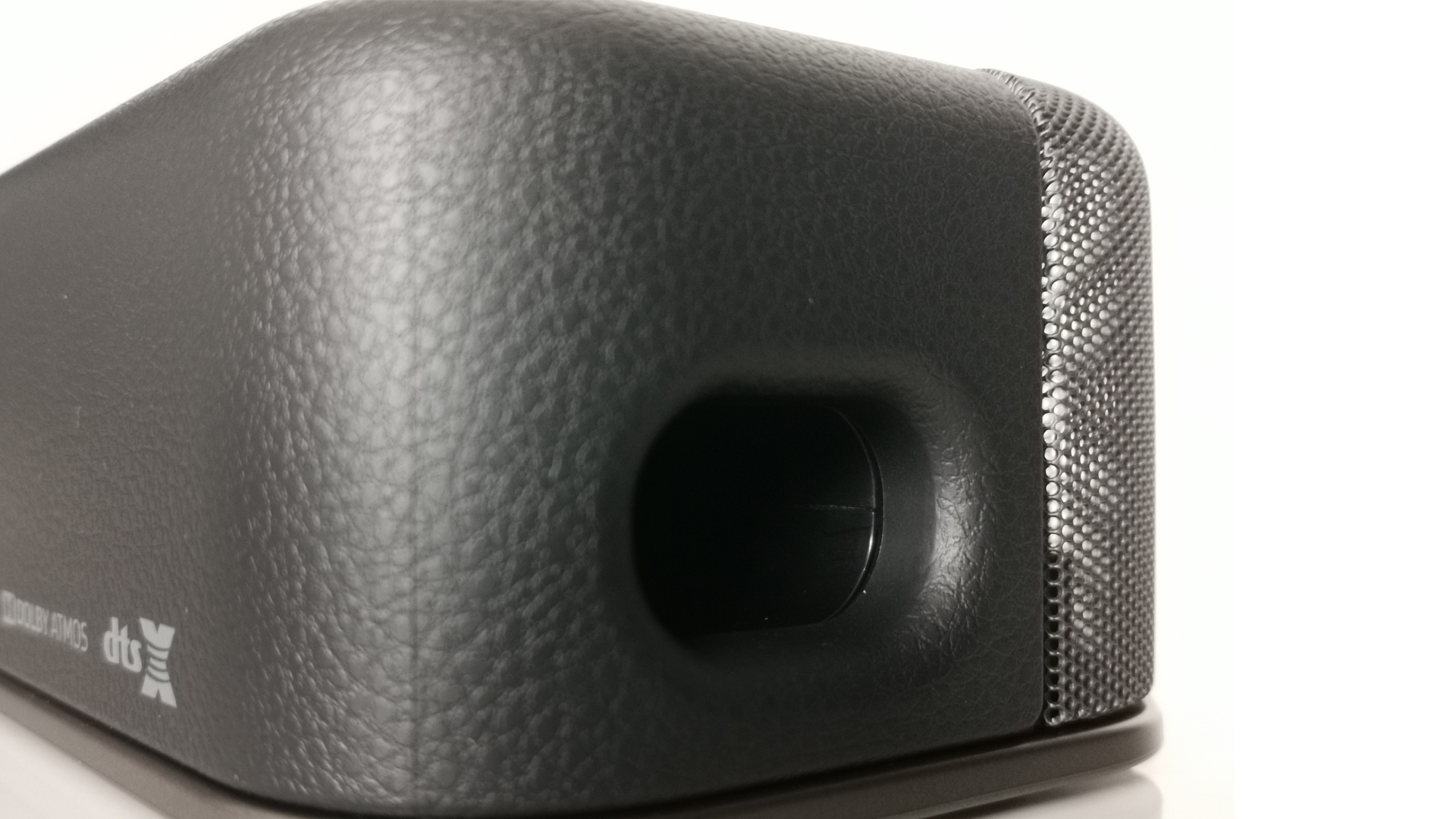
But the Sony HT-X8500 soundbar isn't perfect. Sony claims it approximates a soundfield comparable to an Atmos 7.1.2 system, which is something of a stretch.
The HT-X8500 doesn’t produce compelling overhead audio in the same vein as a 7.1.4 system, but does create a soundstage as high as it is wide. Parked in the sweet spot (there is one, so make sure you’re sitting in it), we were definitely left with the impression that sounds were whipping out either side of our listening position. Everest (Blu-ray, in Dolby Atmos) proves suitably chilling. When the big storm hits, the HT-X8500 unleashes projectiles of ice left and right. It’s enough to make you shiver and shudder.
In truth, there’s not a great deal of difference between a genuine 3D movie mix and advanced channel codecs like Dolby True HD and DTS-HD MA once they’ve been through Sony’s Vertical Sound processor - and that speaks volumes about the DSP technology Sony has developed with this bar.
Sony HT-X8500 Soundbar review: conclusion
Given that rival Dolby Atmos compatible soundbars typically sell for twice the price, Sony’s HT-X8500 warrants an easy recommendation. Cost-cutting can be attributed to connectivity and features but what’s genuinely confounding is just how great the HT-X8500 sounds. If you want a home theatre sound system that won’t dent your budget, it’s probably the best option to come around this year.
Also consider...
If our Sony HT-X8500 Soundbar review has you considering other options, here are three more soundbars to ponder.
Sonos Beam
If you can live without Dolby Atmos, the Sonos Beam is a viable alternative to the HT-X8500. It’s a similarly compact, high performance offering, albeit one designed for those with (or planning to buy) a Sonos multiroom wireless system. It combines musicality with a lively performance, and can work with Amazon Alexa and Google Assistant.
Check out our Sonos Beam review
Sonos Beam (Gen 2)
There's a newer version of the Sonos Beam which is also worth considering. The Beam Gen 2 is a solid upgrade with Dolby Atmos support, HDMI eARC compatibility, and a refreshed design. It also works well in small spaces, while its mid-range price won’t be too hard on your bank balance.
Check out our Sonos Beam (Gen 2) review
JBL Bar 5.1
Another older soundbar, but one that offers a step up in terms of audio. The JBL Bar 5.1 delivers wireless surround sound from a soundbar. The sound palette that it offers isn’t as rich as some of its competitors, but its transforming surround sound capabilities are impressive.
Check out our JBL Bar 5.1 review
- First reviewed September 2019.
Steve has been writing about AV and home cinema since the dawn of time, or more accurately, since the glory days of VHS and Betamax. He has strong opinions on the latest TV technology, Hi-Fi and Blu-ray/media players, and likes nothing better than to crank up his ludicrously powerful home theatre system to binge-watch TV shows.
